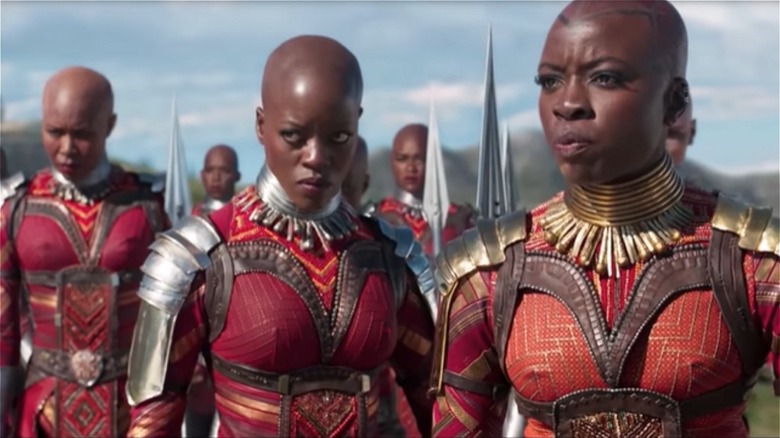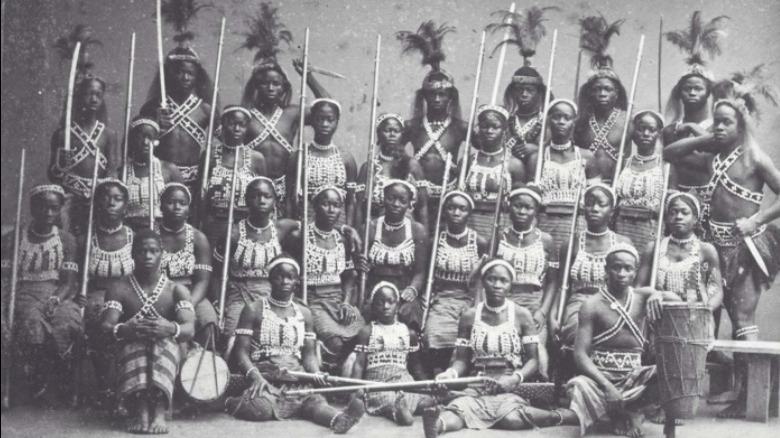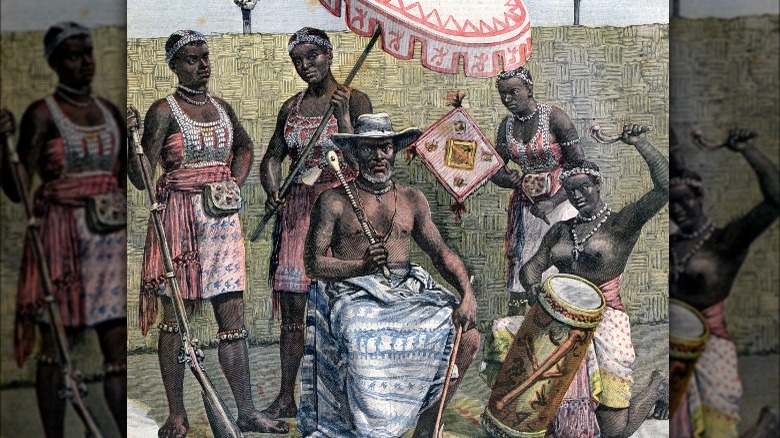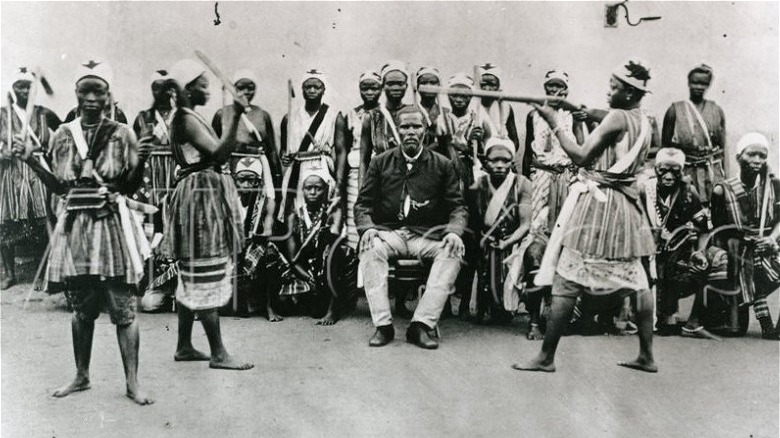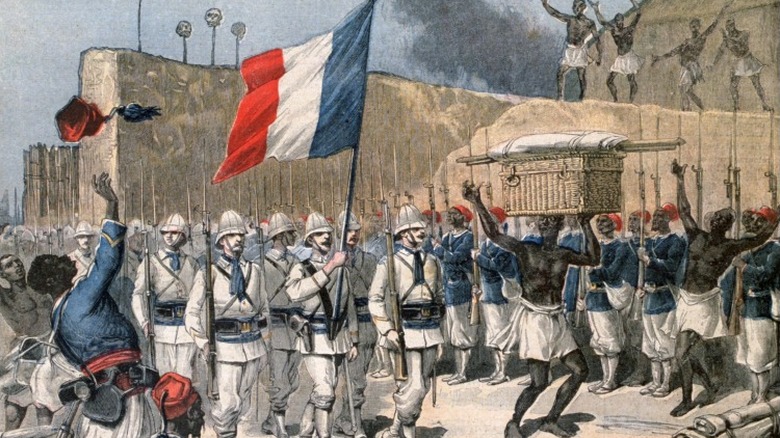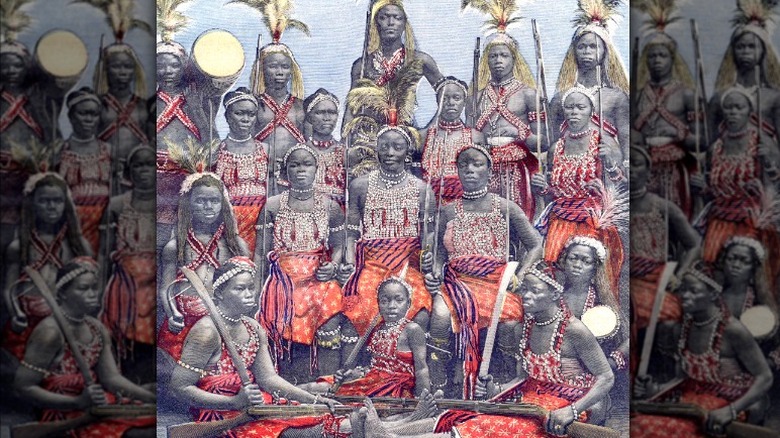Black Panther's Dora Milaje Were Inspired By Real African Female Warriors
Over the last two decades, the world of comic books has gone mainstream and taken off in popularity. The Marvel Cinematic Universe, in particular, has become one of the most successful movie franchises of all time. Iconic comic book series such as "Thor," "Iron Man," and "The Avengers" have been turned into highly anticipated films that bring in billions of dollars from moviegoers across the world.
Though there are many lucrative films in the MCU, one of the most successful was "Black Panther." Released in 2018, the movie starring the iconic Chadwick Boseman was a box office hit and became one of the highest-grossing films of all time (per Parade). In addition to being a history-making portrayal of a Black superhero, the feature also included an excellent depiction of strong female warriors known as the Dora Milaje. What many do not know is that while the Dora Milaje may be a work of fiction, they were inspired by real women, who were certainly larger than life.
Meet The Dahomey Amazons
When you hear the word "Amazon," you likely picture the women warriors associated with ancient Greek legend. According to Greek Mythology, they were a legendary race of female fighters who participated in the Trojan War and were included in one of the Labors of Hercules. While these women are considered a fictional part of ancient Greek lore, over a thousand years later, a different type of Amazon was protecting a kingdom thousands of miles away.
During the 18th century, the Kingdom of Dahomey was established on the western coast of Africa (per Britannica). Structured as an absolute monarchy, the kingdom grew in power through conquering neighboring territories and participating in the slave trade. As its power and influence continued to increase, so did the need to defend and protect itself. To meet this need, the kingdom created arguably one of the most elite fighting forces in history. They were known as the "Mino" ("Our Mothers"), and later on as the "Dahomey Amazons" (via African American Registry).
Origins
Countries, kingdoms, and societies across time have needed to establish militaries to protect themselves or conquer their rivals. The exact date of origin for the Dahomey Amazons isn't known, but some historians speculate that it was during the 18th century (per Culture Trip). There is also debate about which women comprised this group of fighters in its early stages, though their ranks eventually consisted of foreign captives and the lower-ranking wives of the king.
Over time, these women changed from acting police officers who carried large sticks for defense to an elite group of bodyguards with unwavering loyalty to their king. These fighters were also versatile in the sense that in addition to protecting the monarch, they were also used as militia when it came to conflict with rival kingdoms. By the 19th century, their numbers had grown into the thousands, and they were hailed as the protectors of not only the king but also of their people.
Daily Life And Training
Building a skilled and elite military is no small feat. As such, living the life of a Dahomey Amazon was dangerous and downright brutal. In order to achieve the mantle of one of these warriors, women had to do more than be captured or married to the king. According to All That's Interesting, they underwent extreme training and harsh testing that included gauging their pain tolerance along with their strength and athletic ability. Additionally, they were intentionally trained to be ruthless when it came to death by undergoing "insensitivity training," which often involved killing prisoners of war in savage ways.
As a condition of their participation, these women were not allowed to have children or any family connections (per Culture Trip). Though they were all technically "married" to the king, they lived a life of celibacy. However, being this type of soldier did come with some perks. They experienced the opulence of the king's palace and had unlimited access to tobacco and alcohol. They were also given their own enslaved people and were greatly revered and celebrated by their population. So fierce were these women that their European counterparts bestowed upon them the name of the "Amazons," after the legendary warriors of Greek mythology.
Unfortunate Ending
The Kingdom of Dahomey prospered for centuries before running into problems during the latter part of the 1800s. By this time, it is estimated that the Dahomey Amazons ranks had grown to over 4,000 warriors (per Time). Despite daunting numbers, intense training, and being organized into different corps that honed specific skills, the rise of colonialism — particularly by the French — proved to be a formidable challenge.
Despite having a long history of working together, the relationship between the Kingdom of Dahomey and France came to a rather violent end. According to Culture Trip, though the French respected the courage and skill of the Dahomey Amazons, it did not stop them from ultimately conquering them. During the Second Franco-Dahomean War, the French managed to defeat the Mino, as they had advantages in both the number of soldiers and their advanced weaponry. French colonial rule was established and remained the law of the land until 1960, when "French Dahomey" gained its independence. Today, it is known as the country of Benin.
A Respected Legacy
So what happened to the Dahomey Amazons after the kingdom fell to the French? Like much of their history, their ending is also shrouded in a bit of mystery. When Dahomey fell, the militia and its elite female warriors were no longer needed and eventually died out (per Culture Trip). Debate exists over when the last Dahomey Amazon died, with some sources stating 1940, while others say it was as late as 1979.
Until the release of "Black Panther," it is fair to say that the history of these brave and ruthless warriors was somewhat forgotten. However, the big screen portrayal of these incredibly skilled and devoted women has brought their fascinating story to light. These women were not only masters of their craft — they were loyal to their king and heroes to their people. While their history is both mysterious and somewhat fantastical, their legacy as one of the past's most elite female fighting forces has now become a recognized and revered part of world culture.
